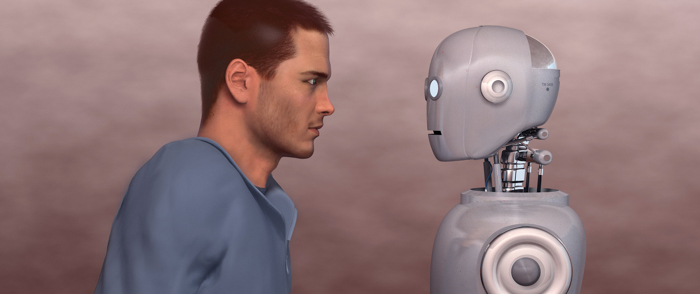The Future of HCM Through "Westworld": Inhuman Resources?

This article was updated on September 5, 2018.
What happens when humankind gains the ability to create realistic-looking robot replacements that seemingly act, think and even feel like the real thing? HBO's take on the matter is "Westworld," a TV show featuring a theme park designed to mimic the wild west complete with android "hosts" — both cowboys and townspeople — that paying guests can interact with in any way they desire. Not surprisingly, things quickly take a dark turn and theories about who is and who isn't a robot abound. Critical reception and emotional analysis aside, however, there's another talking point here — the future of HCM through "Westworld."
Could humanoid "hosts" really become the future of human capital management?
The Automation Alternative
Let's take a step back, since human-like robots with the ability to think critically and act intelligently aren't exactly around the corner. For HCM, "Westworld" speaks to another critical point — automation. Beyond the necessary maintenance required to keep the robots up and running, they're largely self-sufficient, going about their "lives" and performing tasks with virtually no oversight. As applied to current HR departments, this trend toward automating specific processes, such as performance evaluations or long-term performance data, is used to predict the potential for sudden employment crises or staffing shifts. Put simply, there's already room for robots in HR when it comes to automation.
The HR Issue
Rolling Stone notes one of the biggest problems plaguing "Westworld" isn't the guests shooting up hosts or the mounting existential tension which stems from the robots' emerging consciousness — it's the HR department. For example, the episode "The Adversary" saw medical technician Felix giving new host Maeve a tour of the supposedly top secret facility in clear violation of firm policies. What's more, the mechanics, artists and security guards of "Westworld" seem in a constant state of struggle for control and power, rather than working together to ensure the park's ongoing safety and secrecy. This dilemma points to a possible evolving role for automation. Bloomberg reports there's an 84 percent probability that the role of human security guards will be supplanted by automated processes in the next 20 years. And while this might spark frustration among concerned workers, there's a big benefit for HR — the ability to supply processes and procedures and ensure they're followed to the letter.
Breaking the Code
In the TV series, some of the hosts' more advanced code was developed by other robots rather than human programmers, who don't understand the complexity of the data or how it was arranged to produce a specific result. Looking at the future of HCM through "Westworld" suggests the possibility of self-evaluating and evolving HR tools that could do more than simply process data and spit out results.
Imagine an HR application able to learn from its mistakes — maybe recent staffing predictions missed certain trends or didn't anticipate employee needs for specific benefits. Rather than taking the code back to IT or shopping for another HCM solution, offerings like "Westworld" suggest what it might be like if code could rewrite itself in a way that produced ideal results but didn't require human intervention.
Who's Who?
The ultimate conceit of "Westworld?" Robots "real" enough to pass for humans. According to Inverse, that's a critical theme. Some supposedly human characters are eventually revealed to be robotic hosts, and this kind of television trickery forces viewers to wonder if they could be duped by humanoid approximations.
Hospitality is the ideal industry for this transition. The Straits Times reports there's already a hotel in Japan almost entirely staffed by robots, with humans on-site to handle specific tasks such as bed-making or cleaning services that involve water. Much closer on the timeline, however, are the use of text-based solutions such as chatbots, which can pass as humans over the course of brief conversations to accomplish fixed goals. When it comes to HCM, intelligent chatbots are on the horizon as a way to streamline business-user contact, ensure timely responses and only utilize more expensive human capital as required.
Inhuman resources aren't so farfetched. While the dystopian future of "Westworld" won't emerge in the next five years, automated HCM processes, intelligent analytics and the rise of human-like chatbots could be the new face of human capital management.



